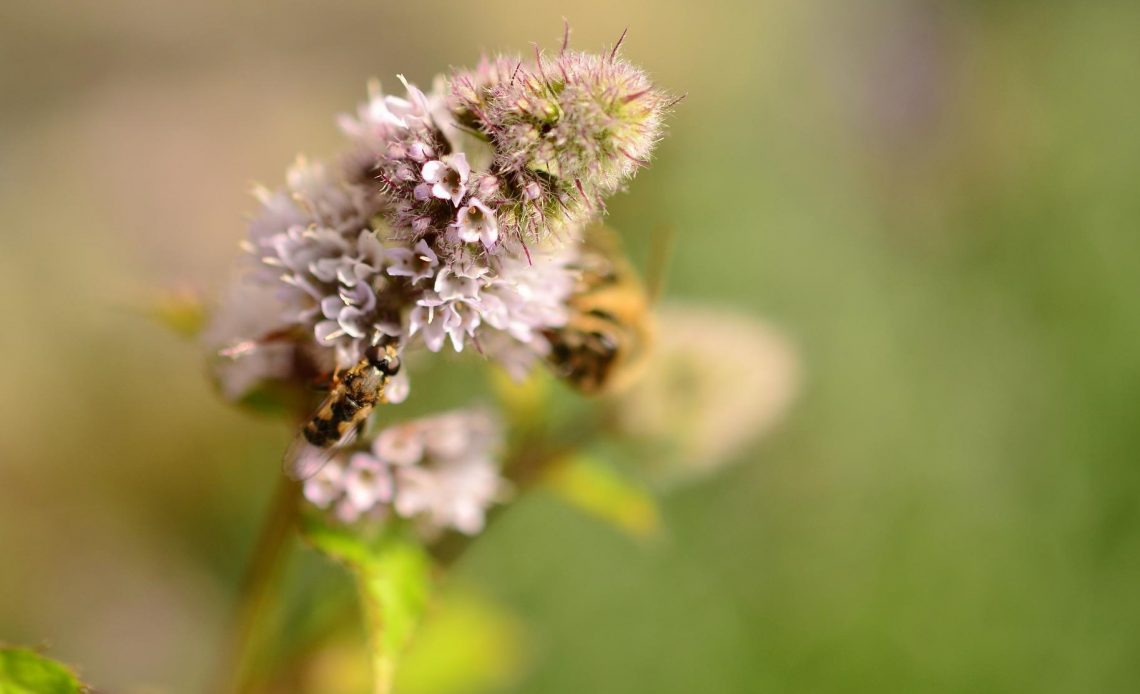

We’re here to help! Wild Yards is a completely free website that is 100% dedicated to helping you create a wildlife-friendly, sustainable yard. Read more
WildYards is reader-supported. When you buy a product through a link on our site, we may earn a comission. Every product is independently selected by our (obsessive) editors and our reviews are unbiased and objective. Read more about our mission or our privacy policy.
Many of us love the taste of peppermint – but not all creatures seem to be big fans of this minty fresh herb. But, what about beneficial insects that we want to attract to our gardens? For example, do bees like peppermint?
Bees like most varieties of mint. It’s a fantastic deterrent for many insects thanks to its smell – but that doesn’t seem to apply to bees. Interestingly, there is some disagreement over this – as peppermint is frequently used in organic honey bee repellent.
Does peppermint keep bees away?
Peppermint doesn’t necessarily keep bees away – they enjoy visiting different types of mint across the garden. Some anecdotal evidence shows bees seek out the tiny flowers growing on peppermint – as opposed to the plants themselves.
It’s a common misconception that bees hate peppermint – rather, they avoid the oil and extract in its concentrated form. It’s a contentious and complex issue among gardeners, it seems!
Peppermint is one of the strongest-smelling plants you can grow in your garden. Bees have exceptional smell receptors – they are thought to be 50x more sensitive than the average dog! The honeybee, in particular, has evolved to use its incredible sense of smell to find the best sources of nectar and pollen in any garden.
While bees are known to visit some varieties of mint, it stands to reason that the smell of peppermint may deter bees from more nectar-rich flowers they wish to hunt down. It boasts an overpowering musk that – while appealing to us – is inconvenient to many insects. While peppermint won’t harm your local bees, growing it near more fertile plants and flowers may deter them.
Regardless of its reputation, many gardeners use peppermint to help deter flies, mosquitoes, beetles, fleas, moths, aphids, caterpillars, and even spiders. It is also commonly used as a deterrent for bigger animals such as deer, mice, and other rodents.
The reason remains the same – these animals have smell receptors much more powerful than our own – it’s highly distracting for them! Peppermint does produce nectar – but it doesn’t have such a fertile reputation as other blooms such as sunflowers, honeysuckle, and jasmine.
Some gardeners claim that peppermint flowers are worth propagating if you want to attract bees – but evidence remains shaky. Plain mint, and some other varieties, conversely, certainly appeals to bees – it’s likely worth trying to grow a few specimens and to watch for the results.
Should I grow peppermint in my garden?
Despite insect taste preferences, peppermint makes for a delightful plant in any garden, adding to a lovely fragrance you can enjoy across the warmer months.
It’s also worth growing peppermint in your garden if you want to deter insects and bugs without the need for chemicals and pesticides. While its smell is potent, growing this herb will cause no detriment to your garden.
If you want to keep insects away from your home, or where you are likely to tend to your favorite flowers, consider growing peppermint for protection! If you’re allergic to bee stings but still want to welcome pollinators, grow flowers your local buzzers are more likely to enjoy towards the other end of your garden or plot.
Strategically growing peppermint across your yard provides some control over which animals visit you. For example, you may wish to grow plants and flowers that purely attract butterflies and hummingbirds around peppermint, too – to build something of an exclusive ‘club’ without the risk of bees taking up all the nectar.
Do bees like the smell of peppermint oil?
Peppermint oil is said to deter bees thanks to its super-strong, concentrated smell. That doesn’t mean bees won’t visit peppermint flowers – but using a concentrated blend is likely to be more effective than growing plants outright to deter insects.
Many eco-friendly insect repellents contain peppermint oil as a key ingredient for this reason. If you want to attract bees to your garden, remember that using these sprays and solutions will likely deter useful insects as much as pests.
Does peppermint attract any insects?
Peppermint is highly attractive to certain butterflies, such as the Buckeye, the Red Admiral, and the Monarch. Many butterflies appear to enjoy the smells that peppermint provides – though, they show no preference across the whole of the mint family.
If you want to attract butterflies but not bees to your garden, planting peppermint may be worthwhile – as the latter will typically prefer other flowers. Remember to grow it away from other flowers bees love, and your butterflies won’t have much competition for the little nectar peppermint can provide.
What herbs do bees like?
Although our friendly little buzzers may not be the biggest peppermint fans, they prefer basil, chamomile, lavender, rosemary, thyme, and sage. You may also attract bees with less fragrant herbs such as catnip, fennel, and cilantro. The bee balm is similarly ideal for attracting winged pollinators.
Are bees attracted to peppermint plants?
Bees love mint – and that appears to be the case for peppermint’s delicate flowers, too, despite some claims to the contrary. You can still welcome bees to a garden full of peppermint – just make sure to grow plants and flowers they prefer far away from your crops. Alternatively, plant plain mint instead – which bees are known to enjoy visiting.
If you really want to avoid bees, try splashing or spraying some concentrated peppermint oil across your garden instead of merely growing the plants outright.
